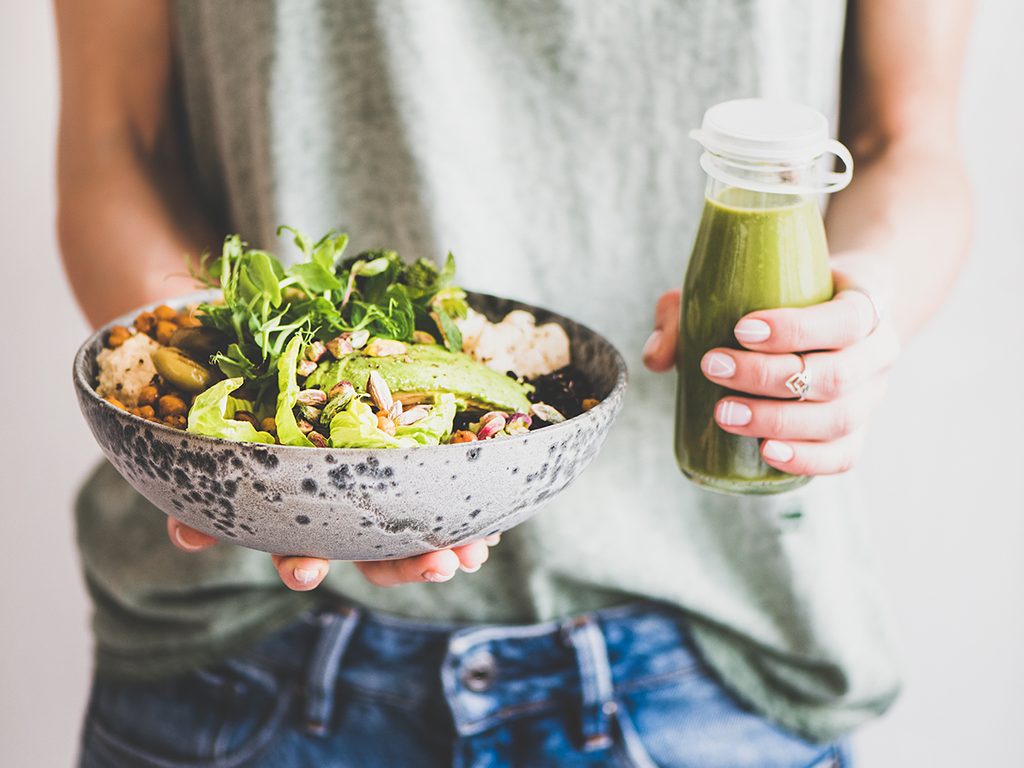Vegan? Make Sure You Eat These Nutritional Superstars

A nutrition expert shares the four nutrients every vegan needs for optimal health.
A little preparation can go a long way toward eating for immune system resilience. But without a game plan, vegans may lack the nutrients that are essential for healthy immune function. For one thing, key vitamins and minerals are lower (or even absent in the case of vitamin B12) in plant-based foods than in seafood and meat. Additionally, the ability to absorb certain vital nutrients is lower in vegan diets than omnivore diets. But don’t despair: Here’s what you need to know to make the most of your diet.
Pump up your iron
Plant-based diets have the potential for decreased iron absorption. When iron levels drop, it impairs the immune system’s response to infection. Tempeh, instant pot lentils, sprouted seeds and soaked nuts (especially cashews and almonds) are excellent sources of iron. Vegans need to remember that several factors can block iron uptake, including foods that are high in phytates (such as legumes, grains, nuts and seeds), calcium, tea and coffee. On the plus side, sprouting, soaking and fermenting effectively reduces phytates and increases mineral intake. Bonus: These food-prep methods also raise immunity! Your body isn’t required to work as hard as it does when digesting raw vegetables, nuts and seeds.
Focus on the C
The presence of immune-boosting vitamin C in iron-rich meals increases this mineral’s bioavailability. Bell peppers, broccoli, strawberries, kiwi fruit and kale are packed with more vitamin C than oranges. Tossing iron-rich kale, sprouted quinoa, strawberries and toasted almond slivers in a citrus dressing makes a great immune-strengthening salad. Elderberries deserve special mention as an antiviral supplement. Rich in vitamin C and iron, these dynamos combat infection and provide essential vegan micronutrients. This herbal extract is easily absorbed in fermented capsule form.
Think Zinc
Adding pumpkin seeds to salads, granolas and sauteed veggies provides a significant vegan source of zinc for immunity. Zinc intakes and concentrations are typically lower in vegetarians than non-vegetarians. (Here are the signs you’re not getting enough zinc in your diet.) Supplementing with a daily lozenge can increase zinc to the nose and throat — the “gateway” for some viruses. Spread your zinc intake over a few meals each day, as multiple smaller doses are better absorbed by your body.
Snack on Selenium
Eating a few Brazil nuts, which contain iron and zinc, will nourish you with the richest source of another mineral: selenium. Selenium is an anti-inflammatory mineral that’s especially important for vegans to boost their immune response. It’s recommended that vegans have 50 to 100 micrograms each day, and from whole foods rather than supplements to avoid possible toxicity. A shiitake and cremini mushroom side dish offers another delicious source of selenium.
Paige Purvis is an integrative nutrition health coach and CEO of Radiant Self Wellness.
Now that you know the essential nutrients for vegans, find out what happens to your body when you go vegan.




